-
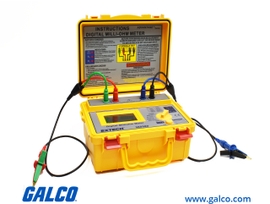 380580Extech Instruments Resistance Meters, 380580 Series
380580Extech Instruments Resistance Meters, 380580 Series Item Number380580MFG Item Number380580Series380580Product DescriptionMILLIOHMMETER, BATTERY POWEREDSpecifications
Item Number380580MFG Item Number380580Series380580Product DescriptionMILLIOHMMETER, BATTERY POWEREDSpecificationsSpecifications Resistance Max 2,000 mOhms AC Voltage Test No Low Resistance Test No Power Source 8 x AA Data Hold Yes Backlight No Low Battery Indication No Multimeter Functions No AvailabilityOrder by 5:00 PM ET and your package will ship the same day. -
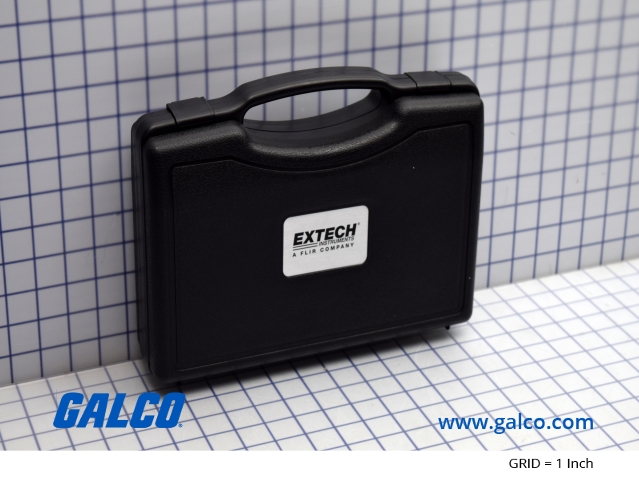 380260Extech Instruments Resistance Meters, 380 Series
380260Extech Instruments Resistance Meters, 380 Series Item Number380260MFG Item Number380260Series380Product DescriptionMEGOHMMETER, AUTORANGING DIGITALSpecifications
Item Number380260MFG Item Number380260Series380Product DescriptionMEGOHMMETER, AUTORANGING DIGITALSpecificationsSpecifications Resistance Max 2,000,000,000 MegOhm Voltage Max 1,000 V AC Voltage Test Yes Low Resistance Test Yes Power Source 6 x AA Data Hold Yes Backlight Yes Low Battery Indication Yes Multimeter Functions No AvailabilityOrder by 5:00 PM ET and your package will ship the same day. -
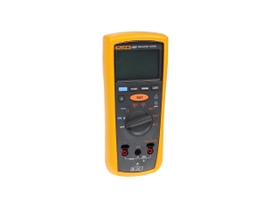 FLUKE-1507Fluke Resistance Meters, 1500 Series
FLUKE-1507Fluke Resistance Meters, 1500 Series Item NumberFLUKE-1507MFG Item Number5066006Series1500Product DescriptionINSULATION TESTERSpecifications
Item NumberFLUKE-1507MFG Item Number5066006Series1500Product DescriptionINSULATION TESTERSpecificationsSpecifications Resistance Max 10,000,000,000 MegOhm Voltage Max 600 V AC Voltage Test Yes Low Resistance Test Yes Power Source 4 x AA Working Temperature Range 4-131 °F Data Hold Yes Backlight Yes Low Battery Indication Yes Multimeter Functions Yes AvailabilityOrder by 5:00 PM ET and your package will ship the same day. -
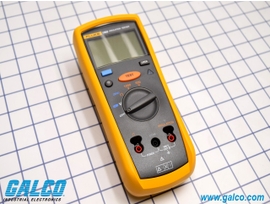 FLUKE-1503Fluke Resistance Meters, 1500 Series
FLUKE-1503Fluke Resistance Meters, 1500 Series Item NumberFLUKE-1503MFG Item Number5065990Series1500Product DescriptionINSULATION TESTERSpecifications
Item NumberFLUKE-1503MFG Item Number5065990Series1500Product DescriptionINSULATION TESTERSpecificationsSpecifications Resistance Max 2,000,000,000 MegOhm Voltage Max 600 V AC Voltage Test Yes Low Resistance Test Yes Power Source 4 x AA Working Temperature Range 4-131 °F Data Hold Yes Backlight Yes Low Battery Indication Yes Multimeter Functions Yes AvailabilityOrder by 5:00 PM ET and your package will ship the same day. -
 AMB-45Amprobe Resistance Meters, AMB Series
AMB-45Amprobe Resistance Meters, AMB Series Item NumberAMB-45MFG Item Number2731024SeriesAMBProduct DescriptionMegohmmeter Digital Battery Type,Specifications
Item NumberAMB-45MFG Item Number2731024SeriesAMBProduct DescriptionMegohmmeter Digital Battery Type,SpecificationsSpecifications Resistance Max 4,000,000,000 MegOhm Voltage Max 600 V AC Voltage Test Yes Low Resistance Test Yes Power Source 8 x AA Data Hold Yes Backlight No Low Battery Indication Yes Multimeter Functions No AvailabilityOrder by 5:00 PM ET and your package will ship the same day. -
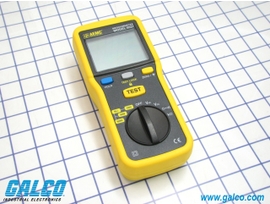 2126.53AEMC Resistance Meters
2126.53AEMC Resistance Meters Item Number2126.53MFG Item Number6527Product DescriptionMegohmmeter Model 6527 (DigitalSpecifications
Item Number2126.53MFG Item Number6527Product DescriptionMegohmmeter Model 6527 (DigitalSpecificationsSpecifications Resistance Max 4,000 MegOhm Voltage Max 1,000 V AC Voltage Test Yes Power Source 6 x AA Data Hold Yes Backlight Yes AvailabilityOrder by 5:00 PM ET and your package will ship the same day. -
 2130.03AEMC Resistance Meters
2130.03AEMC Resistance Meters Item Number2130.03MFG Item Number1060Product DescriptionMegohmmeter Model 1060 (Digital,Specifications
Item Number2130.03MFG Item Number1060Product DescriptionMegohmmeter Model 1060 (Digital,SpecificationsSpecifications Resistance Max 4,000,000 MegOhm Voltage Max 1,000 V Power Source NiMH Rechargeable Backlight Yes AvailabilityOrder by 5:00 PM ET and your package will ship the same day. -
 2130.21AEMC Resistance Meters, 5060 Series
2130.21AEMC Resistance Meters, 5060 Series Item Number2130.21MFG Item Number5060Series5060Product DescriptionMegohmmeter Model 5060 (Digital,Specifications
Item Number2130.21MFG Item Number5060Series5060Product DescriptionMegohmmeter Model 5060 (Digital,SpecificationsSpecifications Resistance Max 10,000,000,000,000 MegOhm Voltage Max 5,000 V AC Voltage Test Yes Low Resistance Test Yes Power Source 8 NiMH Rechargeable Backlight Yes Multimeter Functions No AvailabilityOrder by 5:00 PM ET and your package will ship the same day. -
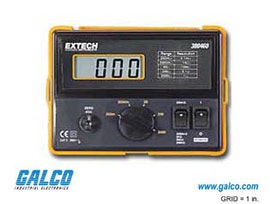 380460Extech Instruments Resistance Meters, 380460 Series
380460Extech Instruments Resistance Meters, 380460 Series Item Number380460MFG Item Number380460Series380460Product Description4-WIRE MILLI-OHM METER, 110VACSpecifications
Item Number380460MFG Item Number380460Series380460Product Description4-WIRE MILLI-OHM METER, 110VACSpecificationsSpecifications Resistance Max 2,000 mOhms Voltage Max 3.8 V AC Voltage Test No Low Resistance Test Yes Data Hold No Backlight No Low Battery Indication No Multimeter Functions No AvailabilityOrder by 5:00 PM ET and your package will ship the same day. -
 380460-NISTExtech Instruments Resistance Meters, 380460 Series
380460-NISTExtech Instruments Resistance Meters, 380460 Series Item Number380460-NISTMFG Item Number380460-NISTSeries380460Product DescriptionMILLIOHM METER W/NIST, 380460Specifications
Item Number380460-NISTMFG Item Number380460-NISTSeries380460Product DescriptionMILLIOHM METER W/NIST, 380460SpecificationsSpecifications Resistance Max 2,000 mOhms Voltage Max 3.8 V AC Voltage Test No Low Resistance Test Yes Data Hold No Backlight No Low Battery Indication No Multimeter Functions No AvailabilityOrder by 5:00 PM ET and your package will ship the same day.
Search


Resistance Meters
A resistance meter, or ohmmeter, is a testing instrument that measures electrical resistance. Most ohmmeters are digital devices, although analog variants are available to measure rapidly fluctuating values.
Ohmmeters work by passing a constant current through the resistance, with a second circuit that measures voltage across that resistance. A microcontroller or microprocessor then uses Ohm's Law to divide the voltage by the current and display the resulting resistance value to the user.
Resistance meters are suitable for a huge variety of applications, from circuit testing on boards or small electronic devices, to insulation testing on motors, transformers or other heavy machinery.
Ohmmeters work by passing a constant current through the resistance, with a second circuit that measures voltage across that resistance. A microcontroller or microprocessor then uses Ohm's Law to divide the voltage by the current and display the resulting resistance value to the user.
Resistance meters are suitable for a huge variety of applications, from circuit testing on boards or small electronic devices, to insulation testing on motors, transformers or other heavy machinery.


